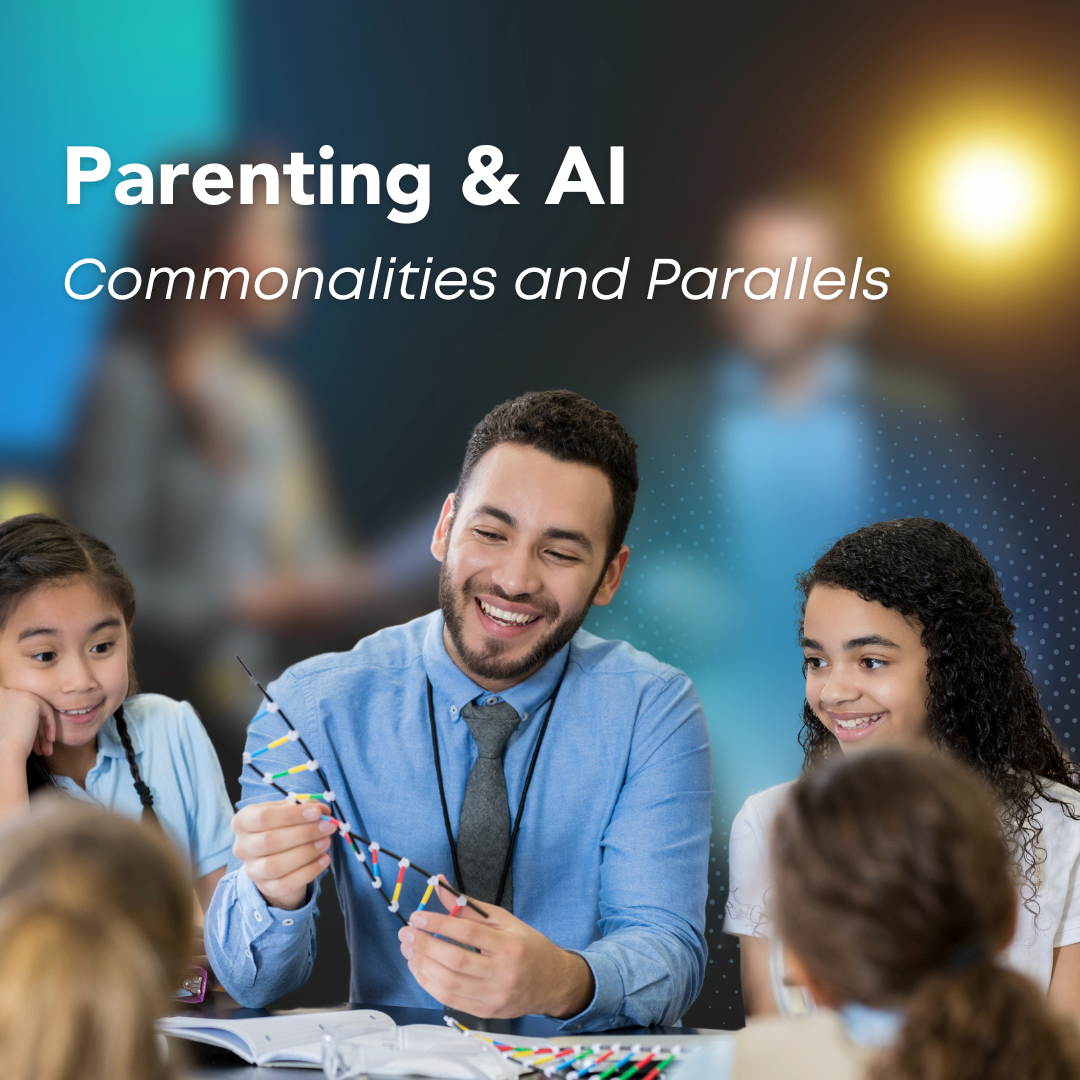13 Commonalities and Parallels- Parenting & AI

Parenting and Artificial Intelligence may seem like unrelated concepts at first glance, but there are indeed some commonalities and parallels between them. Here are some ways in which Parenting and Artificial Intelligence can be related:
- Nurturing and Guidance: Just like parents’ nurture and guide their children through various stages of life, AI systems require training and guidance to learn and improve their performance. In both cases, the goal is to develop independent and capable individuals or systems.
- Learning and Adaptation: Parenting involves continuous learning and adaptation to the needs and behaviours of the child. Similarly, AI systems, particularly those based on machine learning, learn from data and adapt their responses based on new information and experiences.
- Ethics and Values: Good parenting involves instilling ethics, values, and moral principles in children to help them make sound decisions. In the realm of AI, developers and designers need to consider ethical implications and embed human values in AI systems to ensure they make morally sound choices.
- Decision-making: Parents make numerous decisions on behalf of their children until they become mature enough to make their own choices. AI systems are designed to make decisions autonomously, and there is an increasing focus on developing explainable AI to understand and trust their decision-making process.
- Responsiveness and Empathy: Effective parenting involves being responsive to a child’s emotional needs and showing empathy. As AI evolves, there are efforts to develop emotionally intelligent AI that can better understand and respond to human emotions.
- Developmental Milestones: Just as parenting involves guiding children through developmental milestones, AI development follows a process of reaching milestones in terms of functionality, accuracy, and capabilities.
- Safety and Security: Parents prioritize the safety and security of their children. In AI development, safety and security are crucial considerations to prevent harmful outcomes and protect users’ data and privacy.
- Long-term Impact: Parenting aims to raise responsible, independent, and productive individuals who contribute positively to society. Similarly, AI developers strive to create AI systems that have a positive impact on humanity and avoid harmful consequences. Effective parenting aims to raise well-rounded, responsible, and independent individuals who can contribute positively to society. With AI, there is also a focus on building models that have a positive impact on society, address real-world problems, and uphold ethical values.
- Problem-Solving: Parenting often involves addressing challenges and solving problems that arise in a child’s life. AI systems are also designed to solve specific problems, such as natural language processing, image recognition, medical diagnosis, and more.
- Constant Development: Parenting is an ongoing process as children grow and evolve, requiring continuous adjustments and learning. Similarly, AI is in a constant state of development and improvement, with researchers and developers striving to enhance its capabilities and address limitations.
- Interpersonal Interaction: Effective parenting involves understanding and responding to the emotional and social needs of a child. AI developers are working to create more emotionally intelligent AI systems that can interact with users in a more human-like and empathetic manner.
- Learning from Mistakes: Parents understand that children will make mistakes as they grow, and those mistakes can be valuable learning experiences. Similarly, AI systems learn from their mistakes and use that knowledge to improve their performance.
- Evolving Roles: Parenting roles evolve as children grow older and become more independent. AI systems’ roles are also constantly evolving as they become more sophisticated and integrated into various aspects of human life.
While Parenting and Artificial Intelligence are fundamentally different in nature, these commonalities highlight the importance of responsible development, ongoing learning, and ethical considerations in both domains. As AI continues to advance, it is essential to draw lessons from parenting to ensure AI technologies serve humanity’s best interests.
While these commonalities exist, it is essential to acknowledge that parenting and AI are fundamentally different domains. Parenting involves the care and upbringing of human beings, while AI is the creation and development of non-human entities designed to perform specific tasks or functions. Understanding these commonalities can help us approach AI development with greater responsibility, empathy, and ethical considerations, much like effective parenting.
Eager to know more about Parenting?
Pick up a suitable date and time by clicking at the button below, for a Free Strategy Call. See you inside!
- TheCareerWheels
- August 1, 2023
- 11:35 am
- No Comments

